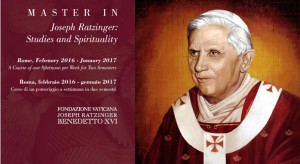 Last November I posted HERE about getting a Masters in Ratzinger Studies at the Augustinianum in Rome. They do the program in both Italian and English and it has been a huge success. HERE
Last November I posted HERE about getting a Masters in Ratzinger Studies at the Augustinianum in Rome. They do the program in both Italian and English and it has been a huge success. HERE
Now saw on Crux 2.0 an interview with a friend of mine in Rome, Msgr. Florian Kolfhaus about this program.
UPDATE: Apparently, the original story was at CNA in German. Then Crux picked it up and beat CNA to it in English.
Now CNA has an English translation. I therefore am making substitutions.
A sample…
Love Pope Benedict’s theology? Try a master’s degree
[…]
For whom is this program intended? Who would enjoy it, or benefit from it?
The program is pertinent to anyone interested in studying theology – regardless of which author someone especially admires. It’s not a “Ratzinger Fan Club,” but rather about joy in the “sacred discipline” that makes an offer to the mind to better understand the faith. Just as there are many spiritualities, so too are there many theologies. Insofar as they don’t contradict doctrine, they are legitimate. The theological “menu” should be abundant, and Joseph Ratzinger can’t be missing from it. The master’s program has proven to be popular among European and American students, but unfortunately there are no German students.
[…]
ow is the response thus far? Is the offer catching on?
The offer has been so well received that the lecture hall is filled to the last seat. There are actually two programs – one in English and another in Italian. Both are, so to say, “booked up.” The students want good theology, and “hunger” for texts that offer more than an information-rich, historical-critical analysis. So there is a true “Ratzinger renaissance,” still in the lifetime of Pope Emeritus Benedict XVI. Only a few years after his resignation, not only are important topics being discussed but also theological methods – like the allegorical or typological interpretation of Sacred Scripture – are being enthusiastically rediscovered. I am sure that this master’s program has a future and I would hope that other universities would adopt this program’s curriculum.
For someone who does not want to start a master’s now, but is interested in studying the most important works of Joseph Ratzinger, what works would you recommend?
As a Mariologist, I would of course recommend Daughter Zion. This short work is about the mother of Jesus, but at the same time it is also about the Church. In Mary, the Church can view herself – like looking in a mirror – in order to understand more deeply who she is. The Church is the important theme of Ratzinger, and he always shows that this mystery leads in turn to Christ, whose body is His people on earth. Ratzinger shows in all of his works that no mystery of the faith is isolated from another. Everything forms a harmonious unity, a nexus mysteriorum. Whoever pulls a book with his works off the shelf finds his way from page to page deeper and deeper into the manifold mysterium of the one faith. I also want to recommend the many lectures of Ratzinger, which are relatively short yet all the more dense, as an introduction to the reading.
What meaning does Joseph Ratzinger have for the interpretation of the Second Vatican Council?
Pope Benedict XVI coined the term “hermeneutic of continuity,” which has since been essential for the interpretation of Vatican II. He himself took part in the Council as a theological advisor and knows not only the texts but also their history of development. In his speech to the Chilean bishops in 1988, which is not yet published in the Opera Omnia, he already said that the last council is no “superdogma” that placed everything preceding it in the shadows. How different is the widespread characterization of the council documents as milestones of a “Copernican Revolution.” For decades, an interpretation of the Council as a fraction in the Church has reigned in many places, which has allowed a new chronology beginning with the Council to come into existence. It is one of Ratzinger’s great merits for this to not be followed in the mainstream. That also earned him – as we know – not only friends, but also enemies.
[…]
Read the rest there.


































The way I see a study for a Master’s degree, a Master’s in Sacred Scripture, Pastoral Theology, Mariology, Morality, Church History or the like is already a bit far-fetched (I make an exception for Canon Law here).
A Master’s focusing on one specific theologian? Doesn’t seem to square with the idea I have of a Master’s program in the theological field.
(With one possible exception, St. Thomas, and then 1. subject to the same reservations I mentioned above about the subdisciplines and 2. with extensive inclusion of the reception of the Thomistic corpus in later theology and Magisterium.)
The general time to focus on one specific theologian would be the doctor’s thesis, in my opinion.
“Like the allegorical or typological interpretation of scripture…….”
What does that mean?
Mary, the catechism has a section explaining the 4 senses of scripture: literal, moral, allegorical, anagogical.
Pingback: FRIDAY EDITION – Big Pulpit